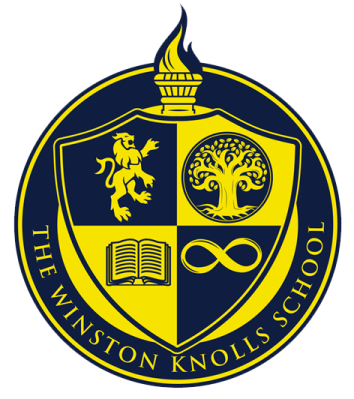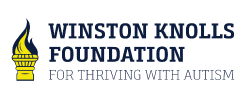Scope
The Winston Knolls School is a private, non-profit school for children with autism and developmental delays, located in Elgin, Illinois. Students are in school for a minimum of 179 school days during the regular school year. During the regular school year, the school hours are 8:50 AM-2:50 PM Monday, Tuesday, Thursday, and Friday. Students attend The Winston Knolls School 8:50 AM- 1:50 PM on Wednesday.
Extended School Year (ESY) runs approximately mid- June through the end of July. Classes are in session for a total of 120 hours over the ESY session, which is approximately 8:50 AM- 1:50 PM; Tuesday through Thursday. The exact end time for ESY varies year-to-year, due to when the July 4th holiday falls on the calendar.
Students are transported to school as determined by their IEP; typically, in a bus or taxi, or driven by the parent. Students are met each day at the appropriate vehicle and escorted into the building by a familiar member of staff. At the end of the day, students are escorted to their vehicle by a member of staff. The Winston Knolls School works closely with drivers to ensure that students are secured appropriately in their vehicle.
The classroom team is led by a state-certified teacher. Classes have a maximum size of eight students, with a minimum of three staff (one classroom teacher, and two assistants) depending on student need. Children enrolled in the program are between the ages of 3 and 19. The Winston Knolls School educates students in grades pre-kindergarten through high school. Students are assigned to classrooms based on ability level, while still maintaining only a four-year age span in each classroom. Classroom Assistants and Life Skills Assistants are trained in the implementation of behavior intervention plans and program instruction. They assist with behavior management and instruction and support the classroom teacher.
The school is overseen by the President/CEO and the Principal. The principal directly supervises the Assistant Principal, the classroom teachers, and the related service staff. The Assistant Principal oversees the BCBA, Behavior Specialists, Classroom Assistants and Life Skills Assistants. The Behavior Specialists collect data on student performance, which is used by the classroom team to develop behavior intervention plans. Consultation with a Board-Certified Behavior Analyst (BCBA) is provided to assist in the development and implementation of appropriate behavior intervention plans as needed, and to supervise the behavior specialists.
Speech and Occupational Therapy services are provided by licensed Speech/Language Pathologists and Occupational Therapists. Speech and Occupational Therapy are incorporated into the curriculum, but students will receive direct and group therapy minutes as determined at their Annual Review. Where appropriate, related services staff will work with and train families and school staff to ensure that augmentative communication devices are being used appropriately in both school and at home. All related service professionals consult with the classroom team on a regular basis to ensure program integrity.
Students will receive Adaptive Physical Education as part of their weekly schedule. The Adaptive PE teacher is a state certified special education teacher. Students receive two, 30-minute Adaptive PE sessions per week, which are held in the school gym.
Clinical FRAMEWORK
SCERTS® is a comprehensive intervention model for children and older individuals with autism spectrum disorder (ASD) and their families. The model can also be used with individuals not on the autism spectrum who are developing social communication and emotional regulation skills. SCERTS provides specific guidelines for helping an individual become a competent and confident social communicator and an active learner. Guidelines are also provided to help an individual to be most available for learning and engaging and to prevent problem behaviors. SCERTS is designed to help families, educators and therapists collaborate in a carefully coordinated manner.
A unique aspect of SCERTS is that the most significant challenges are addressed while identifying and building upon strengths. This is accomplished through family-professional partnerships, and by prioritizing the abilities and supports that will lead to the most positive long-term outcomes. It provides family members and educational teams with a plan for implementing a comprehensive and evidence-based program that will improve the quality of life for people with ASD and their families. The framework of goals and objectives can be used across individuals with a range of developmental abilities. It is a lifespan model that can be used from initial diagnosis, throughout the school years, and beyond. It can be adapted to meet the unique demands of different social settings for younger and older individuals including home, school, community and vocational settings.
Practice in the SCERTS model is based on evidence from multiple sources. First, it is rooted in research on child development as well as research addressing the core challenges of ASD. Second, it incorporates the documentation of meaningful change through the collection of clinical and educational data, and programmatic decisions are made based on objective measurement of change. Third, given that it is not an exclusive model, evidence-based practices from other approaches are easily infused in a program plan for an individual. Finally, practices in the SCERTS Model are supported by empirical evidence from contemporary treatment research in ASD and related disabilities.
The SCERTS Model embodies a framework that is consistent, yet its structure allows for the implementation of a variety of teaching methodologies based on the individual needs of the child. The SCERTS Assessment Process provides all individuals involved with our students with a shared understanding when discussing a child’s needs, laying the groundwork for consistency and continuity of care.
Staff Training
The Winston Knolls School has a full year staff training program, which focuses on best practices for teaching children with special needs, applied behavior analysis techniques, and effective use of curriculum. All staff members attend two days of professional development activities at The Winston Knolls School, before classes resume. During this time, staff training includes Blood Bourne Pathogens and Mandated Reporting for DCFS. There are two additional professional development days included in the school calendar. Each Wednesday during the regular school year, students are dismissed at 2 PM to allow for staff training and development. The Winston Knolls School also holds weekly classroom meetings to review individual student needs and to provide a forum for additional professional development. Staff training also includes appropriate training for new hires.
Staff members are trained in the Nonviolent Crisis Intervention (NCI) system, which includes a full range of strategies and procedures targeting a wide spectrum of adaptive functioning (positive and productive behaviors) and maladaptive functioning (aggressive and self-injurious behaviors).




